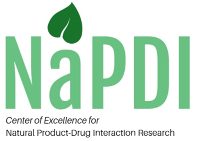Major constituents of goldenseal include the isoquinoline alkaloids berberine, hydrastine, and hydrastinine. These constituents are of particular interest because each contains a methylenedioxyphenyl (MDP) ring. This structural ‘alert’ can give rise to time-dependent, irreversible inhibition of drug metabolizing enzymes, particularly the prominent drug metabolizing enzymes of the cytochrome P450 (CYP) family. The in vivo impact of this type of inhibition is more difficult to predict than simple, reversible CYP inhibition.1 Clinical studies involving healthy volunteers (n=12) demonstrated that, compared to baseline (absence of goldenseal), CYP2D6 and CYP3A activities were reduced by 40-60% following administration of ~1 g of a goldenseal extract three times daily for 14 or 28 days.2-3 More modest effects on CYP2C9 activity were reported after administration of 900 mg berberine to healthy volunteers (n=17) three times daily for 10 days.4 A review further concluded, “…caution should be applied when goldenseal root extract or berberine products are co-administered with narrow therapeutic index drugs that are sensitive substrates of CYP3A4, CYP2D6, or CYP2C9.”5
Although clinically significant CYP-mediated goldenseal-drug interactions have been observed in humans, only a single mechanistic in vitro study has been reported that indicated time-dependent CYP inhibition by MDP-containing goldenseal constituents.6 This report describes the formation of a metabolite-intermediate complex (MIC) between hydrastine and recombinant CYP3A4, CYP2C9, and CYP2D6. Moderately potent KI and kinact values were recovered for the time- and NADPH-dependent inhibition by hydrastine of testosterone 6?-hydroxylation (presumably catalyzed by CYP3A4) in human liver microsomes. Additionally, an MIC was demonstrated with several human CYPs for (-)-hydrastine at high concentrations (>30 ?M), but spectral interference caused by other goldenseal constituents precluded more extensive studies. Collectively, no comprehensive in vitro time-dependent inhibition studies involving these three major CYPs have been reported with constituents, as well as an extract, of goldenseal.
Unlike the CYPs, the inhibitory effects of goldenseal and constituents on drug transporters have not been evaluated using contemporary in vitro systems. Only one in vitro study has been reported that examined the effects of a goldenseal extract (aqueous and ethanolic), berberine, and hydrastine on the activity of one transporter, specifically the efflux transporter P-gp.7 These extracts/constituents showed modest inhibitory effects on P-gp activity. As with the in vitro work, only one clinical study examined the effects of a goldenseal extract on one transporter. Compared to baseline, the area under the plasma concentration vs. time curve (AUC) of the P-gp probe substrate digoxin was not significantly altered in healthy volunteers (n=20) following administration of ~3 g of a goldenseal extract daily for 14 days.8 Since publication of these in vitro and clinical studies, several additional transporters have emerged as important determinants of drug disposition. As such, a major knowledge gap exists with respect to the effects of goldenseal and constituents on the activities of drug transporters.
References
- Grimm SW, Einolf HJ, Hall SD, He K, Lim H-K, Ling K-HJ, Lu C, Nomeir AA, Seibert E, Skordos KW, Tonn GR, Van Horn R, Wang RW, Wong YN, Yang TJ, and Obach RS (2009) The conduct of in vitro studies to address time-dependent inhibition of drug-metabolizing enzymes: a perspective of the pharmaceutical research and manufacturers of America. Drug Metab Dispos 37:1355–1370. (PMID: 19359406)
- Gurley BJ, Gardner SF, Hubbard MA, Williams DK, Gentry WB, Khan IA, and Shah A (2005) In vivo effects of goldenseal, kava kava, black cohosh, and valerian on human cytochrome P450 1A2, 2D6, 2E1, and 3A4/5 phenotypes. Clin Pharmacol Ther 77:415–426. (PMID: 15900287)
- Gurley BJ, Swain A, Hubbard MA, Hartsfield F, Thaden J, Williams DK, Gentry WB, and Tong Y (2008) Supplementation with goldenseal (Hydrastis canadensis), but not kava kava (Piper methysticum), inhibits human CYP3A activity in vivo. Clin Pharmacol Ther 83:61–69. (PMID: 17495878)
-
Guo Y, Chen Y, Tan Z-R, Klaassen CD, and Zhou H-H (2012) Repeated administration of berberine inhibits cytochromes P450 in humans. Eur J Clin Pharmacol 68:213–217. (PMID: 21870106)
-
Hermann R, and von Richter O (2012) Clinical evidence of herbal drugs as perpetrators of pharmacokinetic drug interactions. Planta Med 78:1458–1477. (PMID: 22855269)
-
Chatterjee P, and Franklin MR (2003) Human cytochrome p450 inhibition and metabolic-intermediate complex formation by goldenseal extract and its methylenedioxyphenyl components. Drug Metab Dispos 31:1391–1397. (PMID: 14570772)
- Etheridge AS, Black SR, Patel PR, So J, and Mathews JM (2007) An in vitro evaluation of cytochrome P450 inhibition and P-glycoprotein interaction with goldenseal, Ginkgo biloba, grape seed, milk thistle, and ginseng extracts and their constituents. Planta Med 73:731–741. (PMID: 17611934)
- Gurley BJ, Swain A, Barone GW, Williams DK, Breen P, Yates CR, Stuart LB, Hubbard MA, Tong Y, and Cheboyina S (2007) Effect of goldenseal (Hydrastis canadensis) and kava kava (Piper methysticum) supplementation on digoxin pharmacokinetics in humans. Drug Metab Dispos 35:240–245. (PMID 17079360)
